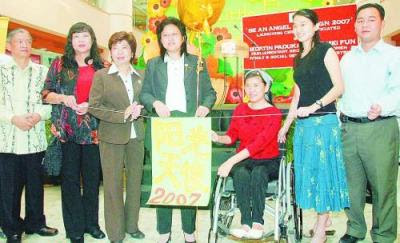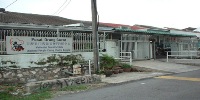 一直以来,由于资金短缺,员工不足, 美门中心的许多活动及对残障朋友的个人关怀工作,都得仰赖义工的协助。因此,从2005年起我们即开始推动阳光天使运动,召募义工成为残障人士的朋友 ,在残障群体与社会之间搭建起友谊的桥梁。
一直以来,由于资金短缺,员工不足, 美门中心的许多活动及对残障朋友的个人关怀工作,都得仰赖义工的协助。因此,从2005年起我们即开始推动阳光天使运动,召募义工成为残障人士的朋友 ,在残障群体与社会之间搭建起友谊的桥梁。
前两年的活动,欣慰的是能成功的在参加者与残障人士之间建立起美好的友情 ,也有一些成为美门中心的义工,常在我们有需要时给予及时的援助。更高兴的是看到成就了一批愿意留下继续推广阳光天使理念的朋友,大家一起努力筹办次年的运动,誓把关怀残障朋友的意识推介得更广。
每一次和他们一起开完会,我都会深深的被他们感动。一批不拘年龄学历背景性别的人,甚至一些在之前未曾相识的人,那么努力的在为另一批与他们毫无血缘关系的人付出。他们无论在工作筹划,宣传推展,节目策划等方面,除了力求完美,还得顾前想后,确保残障朋友可以无碍的参与每一个环节。
前几天,今年的工委会在会议中谈到报名人数不足时,看到大家眼眉之间微有忧色,我忽然觉得很不舍。不舍得让这一批那么热心,那么有爱心,那么愿意为他人牺牲的朋友为我们来承担任何的重担。我多么期望他们在这义务工作的旅途上是满足的,是喜乐的,是他们将来甜蜜回忆的一部份。
虽然无法解决他们所面对的问题,但心里切切的为他们祈祷,期望他们不被任何的失败所打倒,成果固然重要,但其过程更能促进我们的成长。我相信人生没有绝望的地步,希望总在转角之处,多走一步,希望永远为我们留住。(文稿提供:谢秀贞)
By FOONG PEK YEE and NG CHENG YEEMore NGOs and charitable bodies are turning to professional fundraisers to shore up their income. But with minimal supervision and no legislation, the money collected is subject to abuse.
CHARITY has become a business. For both the charitable organisation and the middleman who acts as a professional fundraiser, it is a win-win situation. The former gets an income by lending its name and the latter makes a profit for itself by doing a good deed.
But the one who stands to lose in this equation is the person who contributes to the good cause, not knowing that only a portion of his money goes to the cause.

Doing it on their own: Beautiful Gate prefers to organise activities to raise funds with the help of its volunteers rather than pay fundraising companies.
Malaysians, fairly generous by nature, rally to all types of causes – to support those stricken by illnesses, affected by natural disasters, in dire need of surgery, left homeless by fire and host of other problems.
Often, a meal at a coffeeshop or restaurant is interrupted by those seeking a donation for an orphanage, old folks home, disabled bodies or people with special needs.
However, whether a solicitation for donation is genuine or not is hard to verify on the spot. But what concerns the authorities is the growing trend of charitable organisations which rely on professional fundraisers to collect on their behalf.
Many of such organisations, homes and NGOs (non-governmental organisations) are more than happy to let someone else do the work for which they have no expertise, manpower or time. The authorities are concerned that this has led to some form of abuse – and profiteering.
Segambut MP Datuk Dr Tan Kee Kwong, who has been involved in charity work for years, has seen the ugly side of fundraising.
“Somebody even used my name to sell a dinner table for RM50,000,” said Dr Tan, whose father, the late Dr Tan Chee Khoon, was a politician remembered for his contribution and service to the poor and sick.
“I have vast experience in charity work, and I can tell you that using agents and professional fundraisers is a very bad thing to do. It will end up with lots of problems and abuse,” he says.
 Dr Tan: Somebody used his name to sell a dinner table for RM50,000.
Dr Tan: Somebody used his name to sell a dinner table for RM50,000.
And the abuse can come in various forms – from inflating the price of goods and services in the name of charity to taking advantage of the kind-hearted public.
For instance, one would pay RM10 for a simple car sticker in the name of charity when the cost of the item is a mere fraction of the sum paid.
“But why must the public be made to buy things or services which are priced so ridiculously high and the professional fundraisers or businessmen get a cut.
“Charity for whom? The professional fundraisers as well,” says MP for Ayer Hitam Dr Wee Ka Siong who believes it is time for the government to act on such profiteering.
Worse still, he adds, the donors are made to think that the entire amount goes to charity and this is the same as cheating.
Among the popular items on sale for charity are greeting cards and stickers where the sales people are able to lug around easily.
A salesperson working for a fundraiser, when questioned, shares that of the RM10 paid for a car sticker, RM5 is for the charity home, RM4 for the professional fundraiser and RM1 for the salesperson. The company he works for currently employs 12 sales people whose income is purely based on commission.
He adds that based on what he is able to sell, he earns an average of RM30 a day peddling the stickers at shopping centres.
Do the people he approaches question him on the charity he is collecting for? ”Some of them do ask questions. But there are others who say leave it to Karma on how the money is being used,” he says.
Professional fundraisers getting into the act is certainly not new and such fundraising is seen as a business, especially in the West.
The New York State Attorney General Report on fundraising campaigns in New York State in 2002 reveals that the bulk of the donations had gone to telemarketing companies instead of the charitable organisations.
A total of US$184.3mil (RM632mil) was raised by 607 fundraising campaigns in 2002 but only 31% of the funds or US$57.1mil (RM197mil) went to the charitable organisations.
The rest was paid to the telemarketers as fees and other costs of the campaigns, said the AG's report.
Veteran fundraiser Ann Woo says it is best that non-governmental organisations raised funds on their own instead of engaging professional fundraisers.
With almost 25 years of experience in fundraising, Woo, who is executive secretary to Nanyang Press Foundation, a non-profit organisation active in charity work, says the lack of control in the handling of funds raised has contributed to abuse of the money.
Prior to joining Nanyang Press, Woo was Malaysian Red Crescent Society's community service officer, head of public affairs for the Monfort Boys' Town (a home for underprivileged boys in Selangor) and public relations and fundraising director for Hospis Malaysia.
 The fact that there are big and small companies involved and that they have been around for a long time speaks volumes« ANN WOO
The fact that there are big and small companies involved and that they have been around for a long time speaks volumes« ANN WOO
She says there are individuals or companies “going undercover” in the name of fundraising to make money.
“The fact that there are big and small companies involved and that they have been around for a long time speaks volumes,” says Woo when asked how lucrative this business could be.
Not only is this lucrative business, it allows for “creative accounting” in terms of administrative fees and costs, says a senior medical specialist who is familiar with the work of some NGOs.
“I once met a high-ranking official of an established charity organisation flying business class and staying in a five-star hotel. He said he was there to attend a seminar related to his charity work. I couldn't help but wonder if all these expenses would be charged as administrative costs,” he adds.
On accountability and transparency in the collection and usage of funds for charity, Bukit Mertajam MP Chong Eng suggested a law to get charitable organisations to declare their collection and use of funds.
Such a law had seen the cancellation of the registration of 45 charitable bodies in the New York State in 2002 because they had failed to file in their 2001 reports.
Although Woo too laments the lack of control and transparency of fundraising, she is not sure if legislation is the answer.
“At the end of the day, it really depends on how ethical those involved in fundraising are,” she says.
Although there is currently no legislation on fundraising, Woo says the Welfare Department has a guideline (that is not binding) for an allocation of 30% for the professional fundraiser and 70% for the beneficiary.
A spokeswoman from the Women, Family and Community Department Ministry says NGOs registered with the welfare department and wanting to engage a company to raise funds must state their intention when they request for a “confirmation letter” from the department to raise funds.
“The department will only consider issuing the letter if the amount to be paid to the company is not more than 30%.”
She said professional fundraisers, many of which are public relations companies, should let contributors know their role and their cut before asking for donations.
“Those who donate should also know they have the right to such information.
“Please take the initiative to ask before donating so that those who are out to abuse your kindness and generosity will not get away so easily,” she adds.
Nevertheless, the ministry official says it is in the interest of NGOs not to engage the services of professional fundraisers.
“NGOs must be very careful or else they may end up losing money instead,” she says, citing cases whereby the NGOs had to fork out money to pay the professional fundraisers because the amount raised was not enough to cover the share of the professional fundraiser.
Since expenses incurred in fundraising would deducted from the funds raised, Woo's advice to NGOs and charitable is: “Learn how to raise funds so that you can keep a large portion of the money.”
Chong advocates that how money collected through fundraising is spent be made available for public scrutiny so that contributors could decide whether or not an organisation deserved their support.
“Being good-hearted is important but we must be smart too. We must not let people abuse our kindness,” she says.
Source : http://thestar.com.my/news/story.asp?file=/2007/4/15/focus/17377277&sec=focus
IT WOULD be a gargantuan task for a small charitable home to raise RM10,000 every month through public donations.
Thus, when approached by a professional fundraiser with this promise, the home for children with special needs was more than happy to take on its services.
“We outsourced our fundraising to this professional fundraiser since last year and it has paid off well,” says the spokesman of the home located in Selangor.
Their collaboration appears quite simple. The professional fundraiser would get 50% of the total raised and would have to raise at least RM20,000 a month to keep the contract, said the spokesman.
To a question on whether the sales team had a police permit as required by law to go door-to-door soliciting for funds, the spokesman claims the sales team were his “ volunteers” using the permit issued to the charity home.
“The company or professional fundraiser supervises our volunteers,” he says of the set-up.
He adds that each of the “volunteers” would be paid for food and transport daily. The “supervisor” would also decide on how to remunerate the “volunteers”. The remuneration and money for transportation and food for the volunteers would be from the share of the professional fundraiser.
Besides raking in the money for the home, the spokesman also said the “volunteers” would also help to raise public awareness on the children's home.
The spokesman says that the home engaged the fundraiser for a project that took place from August to December last year. They are currently working on a project which began in January and would end in June.
There are numerous professional fundraisers which have made themselves indispensable to charitable organisations. Among the most established ones is Sharity Greetings (M) Sdn Bhd, a home-grown independent fundraiser that has made the festive greeting card business its niche.
Sharity, which was awarded Good Corporate Citizen Award 2006 by the Malaysia Canada Business Council is said to donate 25% of all net proceeds of greeting cards to their four charity partners: Majlis Kanser Nasional; World Wide Fund for Nature Malaysia; Kiwanis Down Syndrome; and Shelter Home for Children.
But there have been times when the recipient of the contribution ends with the wrong end of the stick.
Yayasan Sunbeams Home founder Pastor Alvin Tan says working with professional fundraisers had taught him a bitter lesson.
“We engaged one of them to organise a charity bazaar last year. They promised to sell coupons and organise the event for us. But we had to chip in 40% of the cost of organising the event to start the project.”
The final tally ended up with the home having to cough up money to the professional fundraiser for its services.
Since then, more than five companies have approached him to co-organise charity events in return for up to 70% of the total amount of money raised, says Tan. But he has turned them all down.
Tan also related a case of people who came to the home and took pictures, only to use them to solicit for funds later.
“We only discovered this when one of our committee members bumped into them in Kepong. They said they had donated in kind to the home using the funds collected. But we had never given permission to them to raise funds for us in the first place.
“They might have collected RM100 but gave us RM50. We do not want such help,” he said.
On donation boxes, Tan said a group of people had asked for the home's donation box to be put in a restaurant, opened by some Hong Kong celebrities in Petaling Jaya.
“We went there and saw people putting money into the box. We were later told that the box was stolen and that a police report had been made,” he says of the incident five years ago.
Beautiful Gate Foundation for the Disabled executive director Sia Siew Chin says the organisation had reservations in accepting offers from these “fundraising” companies to work together.
Relating her experiences working with other charitable organisations which engaged professional fundraisers, she says: “Some of them asked for 50% of the total amount raised. There was a company which asked for 70% of the total amount before the deduction of expenses.”
She said Beautiful Gate preferred to organise activities to raise funds with the help of its volunteers than pay for these fundraising companies though it meant a lot of work for her charity.
Source : http://thestar.com.my/news/story.asp?file=/2007/4/15/focus/17378688&sec=focus
By Jeswan KaurKUALA LUMPUR, April 12 (Bernama) -- As Malaysia celebrates half a century of nationhood, there is still a group of people who feel left out from the mainstream of development.
They, the disabled, have never failed to voice out their grievances, albeit not much is being done to assist them.
"We too want to celebrate the country's 50th independence anniversary but there is really not much for us to enjoy," says Sia Siew Chin, the executive director for Beautiful Gate Foundation, an organisation that helps the disabled to get on with their lives.
Speaking to Bernama recently, she says that for the disabled in the country, life is tough from all aspects, be it employment, education or housing.
"Because we are less able to move about swiftly, we have lost out on the opportunities to earn a decent living and have access to good housing.
Many of the disabled do not attend school because these premises are not disabled-friendly, making it cumbersome for us to move about," she points out.
Sia states that one percent of the population suffer from some form of disability.
"To-date, 170,000 disabled people have registered with the Social Welfare Department but we believe a big number have yet to do so."
HOPING FOR POSITIVE CHANGE
Sia, herself wheelchair bound, feels the country's infra structure, be it the roads, offices, parks, restaurants and schools do not cater to the needs of the disabled, making it hard for them to go anywhere or get anything done.
The disabled, says Sia, are constantly hoping for a positive change that take their needs into account.
"The present transportation system does not fit in with our requirement. Buses have steep and high stairs while trains are a nightmare to board, especially during peak hours. So, the disabled have very limited chances to venture out. Many of us prefer to remain at home, which is not a healthy practice," she adds.
Sia says most often the disabled have to forgo the job offers that came their way because many a times, the offices are not disabled-friendly.
"We are expected to struggle with the able bodied, on the way to our offices. This not only very frustrating but also annoying because it makes us feel less important and neglected," laments Sia.
She says some of the disabled opted to work in factories. Sia visits these factories to ensure that the premises are disabled friendly before recommending the jobs there to her fellow friends.
DO NOT FORGET THE DISABLED
Sia wants the Government to consider providing some form of grant to the disabled to help them start small businesses.
"At Beautiful Gate, we provide job placement services to this group. Mobility for these people is our biggest challenge and concern. We help them acquire customised motorcycles or arrange for transportation to their workplace. It can be very taxing as we receive very little support from the public."
"Housing is also a problem for the disabled as they have little savings to buy a house. Many rent a house and often stay together. But I am sure they too dream of owning a house of their own.
It would really help if housing developers build houses that cater to our needs and sell them to us at a discounted price. I believe we are not asking for much here," pleas Sia.
-- BERNAMA
Source : http://www.bernama.com/bernama/v3/news.php?id=256278
21日起將減少換車次數(八打靈再也訊)rapidKL正致力於提昇八打靈再也北區的巴士服務,以減少搭客轉換巴士的次數,提高巴士服務效率。
rapidKL市場部高級總經理朱麗娜週三(4月11日)指出,從4月21日開始的整頓計劃下,靈北第六區巴士路線所有巴士的集合點,將集中在格拉那再也輕快鐵站。
她在rapidKL第六區巴士路線的匯報會上指出,新推出的T607號巴士,將從阿拉白沙羅(Ara Damansara)或梳邦谷(Lembah Subang)直接抵達格拉那再也輕快鐵站。
她表示,原本607號的巴士,是從聯邦大道第10公里處前往阿拉白沙羅或梳邦谷;可是從21日開始,搭客必須留意所乘搭的巴士,川行路線已有所更改,他們也可以在格拉那再也輕快鐵站轉換所要乘搭的巴士。
公司將提供有殘障設施巴士
此外,rapidKL公關高級經理周庭亦指出,公司將提供有殘障設施的巴士,希望弱勢群體能耐心等待。
針對美門殘障關懷中心總幹事謝秀貞呼籲rapidKL公司與該組織舉行對話會的要求,她表示,由於謝秀貞相當熟悉巴士川行路線及弱勢群體訴求的事項,因此她建議謝氏整理有關資料與適當的地點,並透過郵寄電郵方式致函向她反映。
周庭亦指出,一旦該公司所提供的新路線已穩定下來,她才會安排弱勢團體代表與該公司高層舉行會議,以便瞭解他們的需求。
她呼籲各有關弱勢團體提供各種有利的資料,包括路線圖等,而該公司將會納入考量之內。
約有20名來自八打靈再也北區的居協組織及殘障團體代表,出席了上述匯報會。出席者包括美門殘障關懷中心總幹事謝秀貞、美嘉花園居民協會主席廖威鳴、千百家村村長鄭洄等。
rapidKL的代表則有生產部總經理黃梓崇、巴士營運長葛查里阿都哈密與阿魯威依斯邁。
聯絡:
rapidKL
電話:03-76507788(4月21日之前)、76256999(4月21日之後)
傳真:03-76256667
專線:1-800-388-228
電郵:Email:suggest@rapidkl.com.my (星洲日報/大都會‧2007.04.12)
Source : http://www.sinchew-i.com/article.phtml?artid=200704120758&data=scnews&spid=1539
讓殘障朋友現身說法(八打靈再也訊)為了向大眾傳遞對殘障群體的正確觀念,星洲日報與美門殘障關懷基金會將聯辦3天2夜的“天使培訓營”,讓殘障朋友親自現身說法。
只要籌募100令吉或以上的款項,就能參加於5月4至6日舉行的“天使培訓營”,地點在萬撓馬勝休閒中心。參加者除了能走入殘障同胞的內心世界,同時也能學習正確的方式扶助殘障朋友及宏觀的剖析大馬殘障人士的現況。
活動聯辦團體包括星洲日報、美門殘障關懷基金會、萬撓馬勝休閒中心、衛理青年部及HATI.org.my。
美門殘障關懷基金會表示,殘障群體可分為肢體障礙、視覺障礙、聽覺障礙、智力障礙與多重障礙5種,每一種類的殘障群體都有不同的困難與需要。透過志工們的協助,將有助於他們自立立人。
志工招募活動6至11月進行
自2005年開始,星洲日報與美門殘障關懷基金就聯辦“陽光天使運動”志工招募活動。今年的志工招募活動將於6至11月間進行。參加者將被邀請參與計劃及推動一系列關懷殘障覺醒運動,一起發掘不合規格或被公眾濫用的無障礙設施等。
欲知任何有關“陽光天使運動2007”的詳情,請撥美門殘障關懷基金會熱線:03-78736579/78758609。 (星洲日報‧2007.04.12)

婦女家庭及社會發展部政務次長周美芬(右4)主持“陽光天使運動2007”推介儀式
Source : http://www.sinchew-i.com/article.phtml?artid=200704120857&data=scnews&spid=1539













